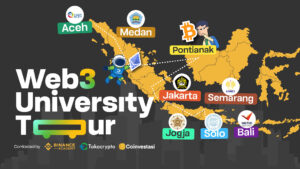Indonesia’s crypto market is moving in two directions at once: trading activity is rising, while the list of legally tradable assets continues to shrink. Rather than contradicting each other, these shifts indicate a market that is becoming more selective, more structured, and increasingly aligned with regulatory standards without losing user participation.
Trading Volumes Rise Under Clearer Operational Rules
By September 2025, Indonesia recorded Rp446.55 trillion in crypto transaction value, driven by sustained momentum in spot trading. The spot market alone reached Rp136.31 trillion in Q3, a 16% increase from the previous quarter. Despite global market volatility, Indonesian traders remain active, with liquidity flowing toward assets with stronger fundamentals and deeper volumes.
This growth comes as the tax structure and exchange operations stabilize. Users now trade under a consistent 0.11% VAT and 0.1% income tax, while licensed exchanges operate with clearer listing boundaries. Combined with Indonesia’s base of 18 million registered crypto users, the rise in transactions reflects steady, measurable participation not temporary hype cycles.
Read more: 4 Markets Proving That Regulation Drives Crypto Growth
Regulators Narrow Asset List Ahead of OJK Oversight
While trading climbs, the number of assets approved for trading has narrowed from 1,421 to 1,307 following routine regulatory evaluations. Assets typically fall off the list due to low liquidity, governance issues, security concerns, or developments in global regulatory actions.
This tightening is part of Indonesia’s broader regulatory transition. Under the Financial Sector Development Law, crypto oversight will shift from BAPPEBTI to OJK, bringing digital assets closer to the supervisory framework used for financial products.
A full VASP licensing regime is expected by 2026, formalizing requirements for exchanges, brokers, custodians, and token issuers. A more curated whitelist is seen as a foundation for this shift, ensuring only assets with stronger fundamentals remain accessible to retail traders.
A Market Consolidating Around Stronger Assets
The rise in trading alongside a smaller asset list reflects consolidation, not contraction. Traders are concentrating activity in assets that already demonstrate stability and demand, while regulators remove tokens that pose unnecessary risks or lack meaningful usage.
For exchanges, this environment demands stronger listing reviews, compliance readiness, and proactive communication with users. For token issuers, Indonesia is no longer a market where listings can be pursued quickly audits, transparent documentation, and regulatory alignment are increasingly required. Users, meanwhile, are asking platforms for clearer explanations on delistings, regulatory changes, and asset criteria, making communication a competitive differentiator.
As the market matures, demand for local guidance, regulatory mapping, and structured execution continues to grow especially among global Web3 companies preparing for OJK’s upcoming supervision.
Why This Matters for Market Entrants
Indonesia remains one of the world’s most active regulated crypto markets one of the few emerging economies where trading volume continues to grow even as standards tighten. The combination of a large user base, predictable tax rules, and a defined supervisory roadmap sets Indonesia apart from other Southeast Asian markets.
This creates a clearer environment for exchanges, fintech firms, and blockchain projects looking to enter or scale in Indonesia: higher activity on the user side, and higher standards on the regulatory side.
At this stage of the market’s development, companies benefit from partners who understand both dynamics. Indonesia Crypto Network (ICN) works with exchanges, fintech firms, and blockchain projects to navigate this transition through market-entry planning, localized execution, and regulatory-aligned strategies. As Indonesia’s crypto framework becomes more standardized, accurate and contextual local insight is no longer optional—it’s essential.
Read more: Why Indonesia Matters for Crypto Brand Growth 2026




